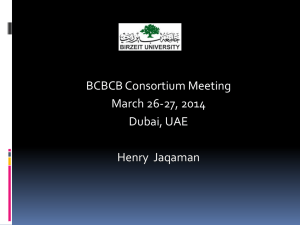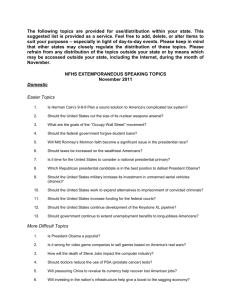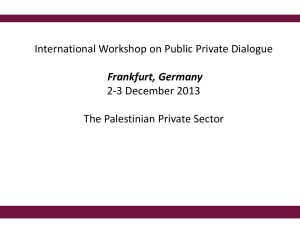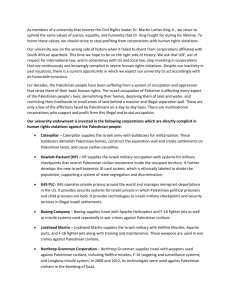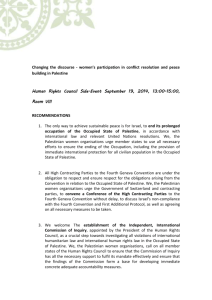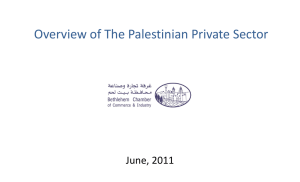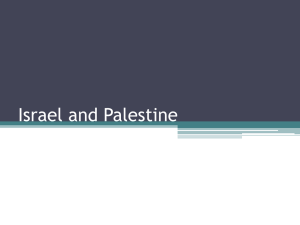to the Study`s Abstract
advertisement
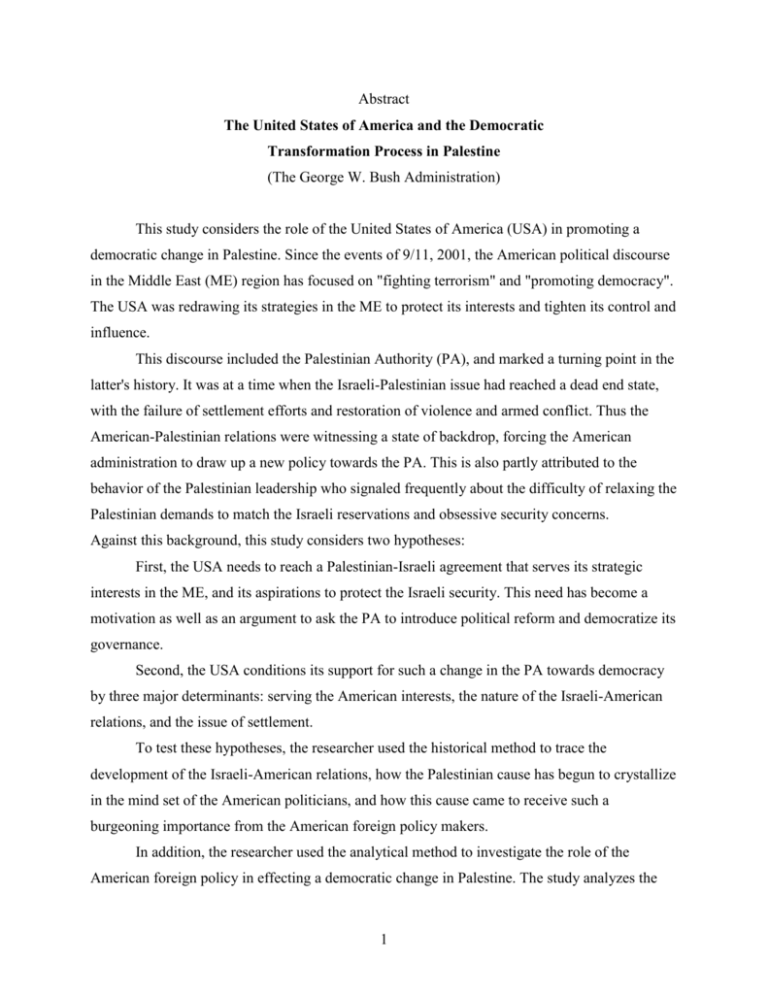
Abstract The United States of America and the Democratic Transformation Process in Palestine (The George W. Bush Administration) This study considers the role of the United States of America (USA) in promoting a democratic change in Palestine. Since the events of 9/11, 2001, the American political discourse in the Middle East (ME) region has focused on "fighting terrorism" and "promoting democracy". The USA was redrawing its strategies in the ME to protect its interests and tighten its control and influence. This discourse included the Palestinian Authority (PA), and marked a turning point in the latter's history. It was at a time when the Israeli-Palestinian issue had reached a dead end state, with the failure of settlement efforts and restoration of violence and armed conflict. Thus the American-Palestinian relations were witnessing a state of backdrop, forcing the American administration to draw up a new policy towards the PA. This is also partly attributed to the behavior of the Palestinian leadership who signaled frequently about the difficulty of relaxing the Palestinian demands to match the Israeli reservations and obsessive security concerns. Against this background, this study considers two hypotheses: First, the USA needs to reach a Palestinian-Israeli agreement that serves its strategic interests in the ME, and its aspirations to protect the Israeli security. This need has become a motivation as well as an argument to ask the PA to introduce political reform and democratize its governance. Second, the USA conditions its support for such a change in the PA towards democracy by three major determinants: serving the American interests, the nature of the Israeli-American relations, and the issue of settlement. To test these hypotheses, the researcher used the historical method to trace the development of the Israeli-American relations, how the Palestinian cause has begun to crystallize in the mind set of the American politicians, and how this cause came to receive such a burgeoning importance from the American foreign policy makers. In addition, the researcher used the analytical method to investigate the role of the American foreign policy in effecting a democratic change in Palestine. The study analyzes the 1 goals and strategies of the American foreign policy in dealing with the Palestinian political system between 2001 and 2006 (the time determinants of the study). The study also dwells on the American political trends towards the Palestinian political system, after the presidential and legislative elections, analyzing the most significant ones and the degree of agreement with the hypotheses. This study is divided into four chapters. Chapter one is devoted to the structure of the study, its objectives, problematique, methodology, and literature review. Chapter two provides a historical framework for the study and is divided correspondingly into two sections. Section one traces the development of the relationship between the USA and the Palestinian cause; and how the American interest in fostering the relations with "Israel" started and increased after taking a decision to play influential roles in the international policy after the Second World War (WWII). This section concludes that the American policy has always been keen on the investment in achieving Israel's military, economic and scientific superiority as a strategic asset in the region. Correspondingly, the American position towards the Palestinian cause has always been in harmony with this requirement of "Israeli superiority" in the region. For that, the USA also worked in the past on breaking up some of the Arab counties' alliances with the ex-Soviet Union and including them in the American alliance. In addition, the American effort to resolve the conflict has been motivated by the desire to achieve a settlement which allows "Israel" to enjoy stability on the security level and to neutralize the Arab countries' threat to the former, giving it an opportunity to integrate in the ME through economic cooperation and paving the way for its integration further in the region. Section two of chapter two explains the political and ideological changes that shaped the Palestinian political trends, specifically towards the Palestinian state and the strategies for its realization. The study observed a sharp decline in this aspect, compared to the foundation covenants of the Palestinian Liberation Organization (PLO) and the Islamic Resistance Movement (Hamas). These trends currently put aside many of the basics of the mentioned covenants, that were once included in the talk about a state from the River Jordan to the Mediterranean (the Palestinian homeland). There has also been a change in the strategies espoused to realize this state, from the armed struggle being the approach to full liberation, to arguments about the political settlement by the PLO, and its acceptance as an option by Hamas 2 even that the movement was initially categorically against it. Yet further, today Hamas is "ready" for a long-term truce (hudna) with "Israel". The study attributes this retraction in the Palestinian political attitude to the absence of a unified Palestinian working strategy that meets the continuously upcoming challenges and international developments. Also relevant here is the fact that many Palestinian factions overweigh internal factors in facing objective challenges. The desire of the factions to stay in the circle of influence in the Arab-Israeli conflict and to monopolize the Palestinian decision, deluded them to adapt their policies in return for achieving an international recognition of their legitimacy. Chapter three focuses on the changes that took place on the international arena following the events of September 11, and their repercussions on the American foreign policy towards the ME. The chapter is specifically concerned with observing the extent to which these changes affected the American conceptualization of national security, and its expansion towards protection; and how these changes have contributed to the embark of a new comprehensive American policy that touched upon political, economic, cultural and social realms on the ME, in pursue of reform. This further allowed the USA to play a leading role in the international foreign policy affairs of the region, as well as to intervene in the internal affairs and policy making of the region's countries, in claim of monitoring their policies in "fighting terrorism" and "fostering freedom and democracy". More specifically, the chapter investigates the above applied to the American foreign policy towards the PA. It highlights the political, economic and cultural strategies that were employed by the American foreign policy makers to achieve specific visions projected by the American administration for the region's future. It argues that the US resorted to "reform" and "democratic change" only following the failure to present a genuine solution to settle the conflict, or to pressure "Israel" to be more flexible in negotiations regarding some of the Palestinian demands. Thus, the American resort to reform came as an attempt to change instead the Palestinian foundations on hard core issues of the negotiations, like Jerusalem, the refugees, and the West Bank settlements; hoping to replace the current perceptions that are founded also in international legal resolutions, by "de-facto"-based more relinquishing perceptions. It was also an attempt from the USA to effect changes in the Palestinian cultural environment on the basis of promoting the above described "realistic" perceptions, and denouncing the "unrealistic" call for 3 the implementation of the UN resolutions, that will accordingly be reflected in the Palestinian political attitude allowing for a settlement that satisfies the American and Israeli interests. The last chapter, chapter four, analyzes the American policies towards the PA in the light of the latter's response to some of the reform demands. Holding pluralistic elections was a case in point. By analyzing the American administration's policy in the wake of the developments in the Palestinian political life, the study observes how the USA has pushed forward for resuming peace talks and strengthening the "moderate" camp within the PA to end up by establishing a temporary Palestinian state and putting on the shelf the more crucial final status issues in the conflict. The USA has never had a clear-cut policy towards the settlement of the Palestinian question. Rather it has always counted on the Israeli steps, setting them up in the context of a two-state solution vision. This was similarly the case when the George W. Bush Administration wanted to invest the Israeli vision based on a unilateral solution, and put it in the context of the Road Map initiative. On the other hand, it was necessary for the USA to abort any attempt that might strengthen the Palestinian negotiating position, especially on the more sensitive issues, and that might consequently delay any possible arrival at a final-status agreement. Thus, the study argues that the USA has always worked to keep a state of rupture within the Palestinian camp, particularly between Fatah and Hamas movements. An example where this was clear is the Palestinian internal scene following the Mecca agreement, when the Americans made strenuous efforts to keep the two parties under pressures of the consensual national Palestinian international demands that were established by the agreement. The arguments continues to state that the American administration was interested in having the PLO as the Palestinian representative in negotiations, and thus pressuring against any substantial reform in the organization's structure and hierarchy, that would affect the Palestinian determinants for the framework and priorities of negotiations. Eventually, the Palestinian party has remained weak; the negotiations have continued but without allowing the Palestinian parties any possible room for strengthening their negotiating position. 4
